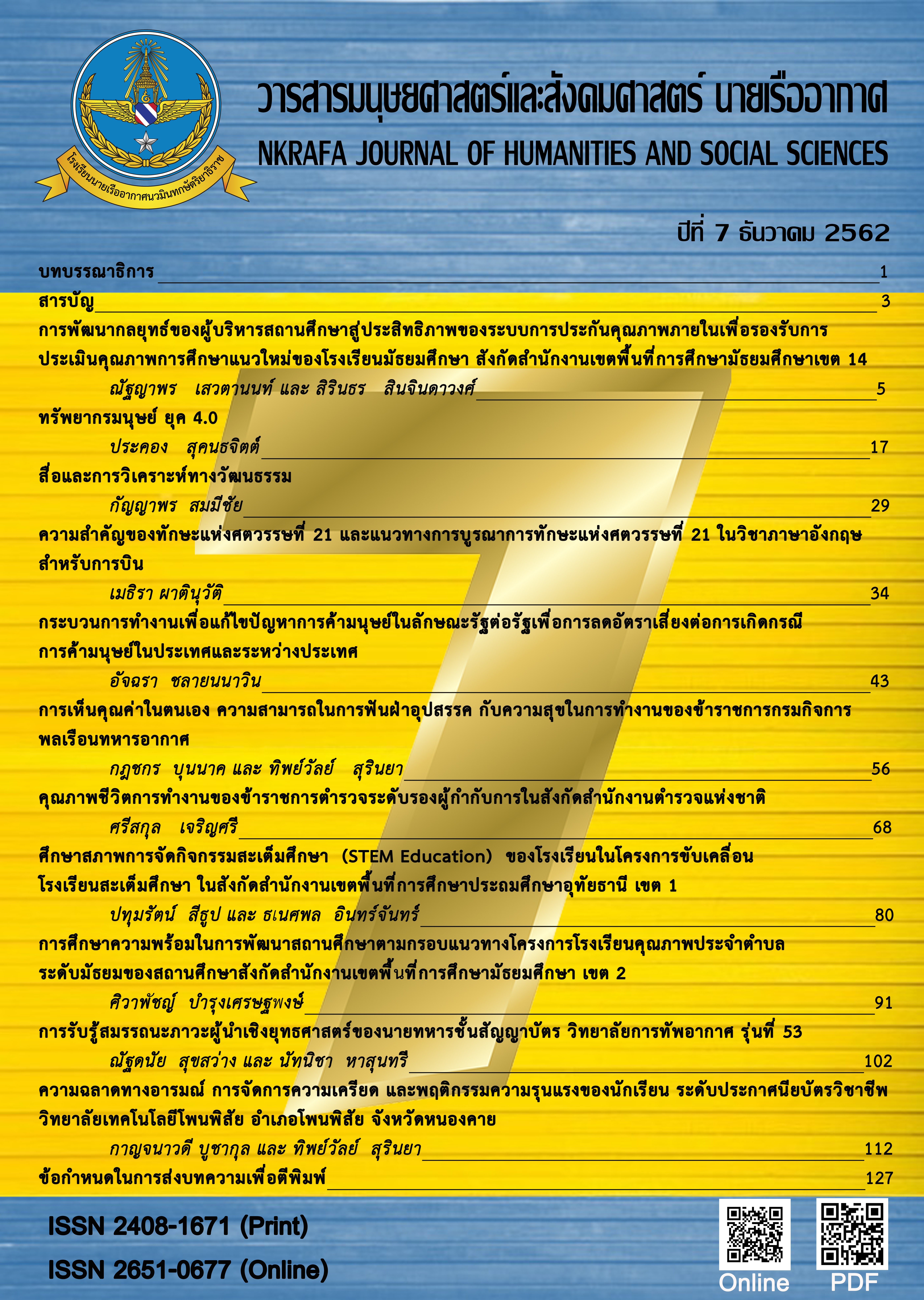The development of school administrators' strategies to the efficiency of the internal quality assurance system to support the evaluation of the new educational quality of secondary schools Under the Office of Secondary Educational Service Area 14
Main Article Content
Abstract
The purpose of this research is to: 1) Determine procedures and establish educational standards in accordance with internal quality assurance systems to support the evaluation of new external education quality of secondary schools under the Office of Secondary Educational Service Area 14 (Phangnga, Phuket, Ranong). 2) To develop the strategies of the school administrators to the efficiency of internal quality assurance in order to support the evaluation of new external education quality of secondary schools under the Office of Secondary Educational Service Area 14 (Phangnga, Phuket, Ranong). Conducted an in-depth interview and examined the quality of the interview form from experts and updated according to the advice of experts And conducted an in-depth interview from executives with knowledge of the new educational quality assurance and who were selected by the Office of Secondary Educational Service Area 14 to be an educational quality assessor in the fourth round. 10 people. The research found that Steps in the preparation of educational standards, internal quality assurance of secondary schools under the Office of Secondary Educational Service Area, Region 14, total 5 steps, Step 1 Prepare and set the standard of education. Step 2 Analyze the relationship of educational standards. Step 3 Determine the educational standards and the list of considerations. Step 4 Examine and review educational standards. Consider. In determining the school's educational standards. There are 3 standards, including standard 1, quality of learners, standard 2, administrative and management processes, standard 3, teaching-learning process that focuses on learners. There are 21 items considered by the Office of Educational Testing. Office of the Basic Education Commission determines and has a list of consideration. Additional consideration items vary according to context, vision, mission, purpose, identity, identity, strengths of educational institutions. Participation in projects and agencies and other agencies of educational institutions such as schools, juristic persons Highly competitive schools International standard school Pracha Rat School Moral school Honest school Sub-district quality schools, etc. Making a memorandum of understanding or cooperation (MOU) of educational institutions and agencies and other agencies. Other strategies of the school administrators to the efficiency of internal quality assurance are 8 strategies, namely 1) management and information system management 2) development of educational standards 3) preparation of educational development plans 4) plan implementation Develop quality of education 5) Educational quality review and review 6) Educational quality assessment and judgment level 7) Annual quality of education report 8) Continuing system maintenance Educational quality assurance.
Article Details
บทความที่ได้รับการตีพิมพ์เป็นลิขสิทธิ์ของวารสารมนุษยศาสตร์และสังคมศาสตร์ นายเรืออากาศ
ข้อความที่ปรากฎในบทความแต่ละเรื่องในวารสารวิชาการเล่มนี้ เป็นความคิดเห็นส่วนตัวของผู้เขียนแต่ละท่าน ไม่เกี่ยวข้องกับโรงเรียนนายเรืออากาศฯ และคณาจารย์ท่านอื่น ๆในโรงเรียนนายเรืออากาศฯ แต่อย่างใด ความรับผิดชอบขององค์ประกอบทั้งหมดของบทความแต่ละเรื่องเป็นของผู้เขียนแต่ละท่าน หากมีความผิดพลาดใด ๆ ผู้เขียนแต่ละท่านจะรับผิดชอบบทความของตนเองแต่เพียงผู้เดียว
References
ราชกิจจานุเบกษา. เล่ม 116 ตอนที่ 78ก. หน้า 3-14.“พระราชบัญญัติการศึกษาแห่งชาติ พ.ศ. 2542.” (2553, 18 สิงหาคม).
ตระการ ก้าวกสิกรรม. 2556. การประกันคุณภาพการศึกษาโรงเรียนนายเรืออากาศ. วารสารมนุษยศาสตร์และสังคมศาสตร์นายเรืออากาศ.ปีที่ 1 ฉบับที่ 1, หน้า 69.
สำนักทดสอบทางการศึกษา. 2553. แนวทางการพัฒนาระบบประกันคุณภาพภายใน สถานศึกษาตามกฎกระทรวงว่าด้วยระบบ หลักเกณฑ์ และวิธีการประกันคุณภาพ การศึกษา พ.ศ. 2553. กรุงเทพฯ: โรงพิมพ์ ชุมนุมสหกรณ์การเกษตรประเทศไทย.
สำนักทดสอบทางการศึกษา. (2554ข). แนวทางการประเมินคุณภาพตามมาตรฐานการศึกษาขั้นพื้นฐาน เพื่อการประเมินคุณภาพภายในของสถานศึกษา. กรุงเทพฯ: โรงพิมพ์ สำนักงานพระพุทธศาสนาแห่งชาติ.
สำนักทดสอบทางการศึกษา. 2561. หลักสูตรการสัมมนาเชิงปฏิบัติการพัฒนามาตรฐานผู้ประเมินคุณภาพ การศึกษาตามรูปแบบแนวทางการประเมินแนวใหม่และกฎกระทรวงการประกันคุณภาพการศึกษา พ.ศ.2561. กรุงเทพฯ: โรงพิมพ์ชุมนุมสหกรณ์การเกษตรแห่งประเทศไทย.
ราชกิจจานุเบกษา. เล่ม 135 ตอนที่ 11ก. หน้า 3-5.“กฎกระทรวง การประกันคุณภาพการศึกษา พ.ศ. 2561.” (2561, 20 กุมภาพันธ์)
สุพักตร์ พิบูลย์. (2557). บริหารจัดการหลักสูตรอย่างมีประสิทธิภาพ. เอกสารประกอบโครงการประชุมสัมมนา ผู้อำนวยการโรงเรียนมัธยมศึกษา 4 ภูมิภาค (ภาคใต้) รุ่นที่ 1 9-11 เมษายน 2557. สุราษฎร์ธานี: โรงแรมไดมอนด์ พลาซ่า. หน้า 5-6.
ไมตรี บุญทศ. (2554). การพัฒนารูปแบบการบริหารเพื่อการประกันคุณภาพภายในที่ส่งผลต่อ คุณภาพ โรงเรียนสังกัดสำนักงานคณะกรรมการการศึกษาขั้นพื้นฐาน. วิทยานิพนธ์ครุศาสตร์ดุษฎีบัณฑิต สาขาวิชาการการบริหารศึกษา. บัณฑิตวิทยาลัย มหาวิทยาลัยราชภัฏอุบลราชธานี, อุบลราชธานี.
อำนวย มีศรี. (2555). องค์ประกอบที่สัมพันธ์กับประสิทธิผลการประกันคุณภาพภายในสถานศึกษาขั้นพื้นฐาน สังกัดสำนักงานเขตพื้นที่การศึกษาประถมศึกษาศรีสะเกษ. วิทยานิพนธ์ครุศาสตรดุษฎีบัณฑิต สาขาวิชาการบริหารการศึกษา. บัณฑิตวิทยาลัย มหาวิทยาลัยราชภัฏอุบลราชธานี, อุบลราชธานี.
สมชัย จรรยาไพบูลย์. (2555). รูปแบบการพัฒนาการประกันคุณภาพภายในสถานศึกษา สังกัดสำนักงานเขตพื้นที่การศึกษามัธยมศึกษา เขต 29. วิทยานิพนธ์ ครุศาสตร์ดุษฎีบัณฑิต สาขาวิชาการบริหารการศึกษา. บัณฑิตวิทยาลัย มหาวิทยาลัยราชภัฏอุบลราชธานี, อุบลราชธานี.
ละมุล รอดขวัญ. (2555). การพัฒนารูปแบบการประกันคุณภาพภายในสถานศึกษาขั้นพื้นฐาน สังกัดสำนักงานเขตพื้นที่การศึกษา ภาคใต้ตอนบน. วิทยานิพนธ์ปรัชญาดุษฎีบัณฑิต มหาวิทยาลัยรามคำแหง, กรุงเทพฯ.
สมชัย จรรยาไพบูลย์. (2555). รูปแบบการพัฒนาการประกันคุณภาพภายในสถานศึกษา สังกัดสำนักงานเขตพื้นที่การศึกษามัธยมศึกษา เขต 29. วิทยานิพนธ์ครุศาสตรดุษฎีบัณฑิต มหาวิทยาลัยราชภัฏอุบลราชธานี, อุบลราชธานี.
ปาริชาติ ชมชื่น. (2555). รูปแบบการบริหารงานวิชาการแบบมีส่วนร่วมของชุมชนที่มีประสิทธิผลในสถานศึกษาสังกัดสำนักงานเขตพื้นที่การศึกษาประถมศึกษา. วิทยานิพนธ์ครุศาสตรดุษฎีบัณฑิต บัณฑิตวิทยาลัย มหาวิทยาลัยราชภัฏอุบลราชธานี.
Keeves P.J. 1988. Educational study, methodology and measurement: An international handbook. Oxford: Pergamon Press.


